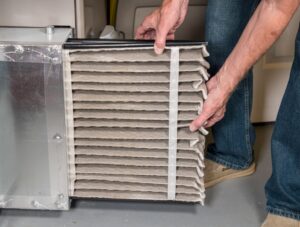Indoor Air Quality In Sedalia, Warrensburg, Marshall, MO, and Surrounding Areas
Indoor Air Quality by Turner Heating & Air Conditioning
With the current pandemic sweeping the globe, indoor air quality (IAQ) has always been a significant concern for many households and workplaces. You may need to look closely at your HVAC systems and make changes if you frequently cough, sneeze, or feel stuffy. These symptoms are indicators that your air quality is poor. Contact us today for indoor air quality in Sedalia, Warrensburg, Marshall, MO, and surrounding areas.
Relation Between HVAC and IAQ

- An HVAC system’s essential role in maintaining a comfortable temperature balance and quality air circulation throughout the interior space should not be undervalued.
- An HVAC system brings air from the outside into the room after being adequately treated. Before entering the indoor space, the air is cleaned using air filters and ionizers.
- Contaminants can linger in your home and cause problems if your HVAC system isn’t functioning correctly. Mold and fungus growth can also be facilitated by moisture.
Why, When, And How To Clean Your HVAC System For Better Indoor Air Quality:
- Every three to five years
Our HVAC systems become contaminated with dust and allergens. The air quality in our homes might be affected by this. Every three to five years might be a good time to make the call to keep the equipment clean. - After noticing the indicators
You may decide to have your HVAC systems cleaned if you notice signs of rodent or rat damage, mold growing in or out of the vent or ductwork, or dirt being released onto surfaces of walls or furniture. The respiratory system may be affected by allergy sufferers. - If you haven’t cleaned your device in a while
Making a call to an HVAC service provider is necessary to improve the air quality in your home. Check your home’s AC to make sure it is functioning correctly or if it has been a while since you had your appliances cleaned when you had them installed or repaired.
Steps You Can Take For Improved IAQ
- Effective Ventilation: Fresh air can be circulated throughout the space, filtered, and then removed with the help of an effective ventilation system. It is necessary to position ducts and intakes to serve this goal successfully.
- Examine Indoor Humidity Levels: Humidity control is vital in more humid environments. Mildew and mold can develop as a result of an HVAC system that is clogged or damaged. You can use a humidifier, indoor fountain, or plants to raise humidity levels.
- Assess Pollution Levels: It is possible to identify different volatile organic compounds (VOCs). To find out the options for improving indoor air quality, you can also seek assistance from your local health department.
- Routine System Upkeep: HVAC systems must have regular inspections and have their air filters changed. A smart AC controller for ductless systems can notify you when your filter needs to be changed.
- Adaptive Air Purifiers: An HVAC’s built-in air filter is only effective against larger particles. A heavy-duty HEPA filter is recommended to capture particles 0.3 microns and larger. Air purifiers eliminate bacteria and viruses by bombarding them with ultraviolet light rays.
- Weatherize Your House: Your home’s ability to weatherize can significantly enhance the quality of the air inside. Improving indoor ventilation can reduce reliance on air conditioning systems.
A happier environment and better physical health are guaranteed by improved air quality. Turner Heating & Air Conditioning can help you improve the indoor air quality of residential and commercial spaces.







